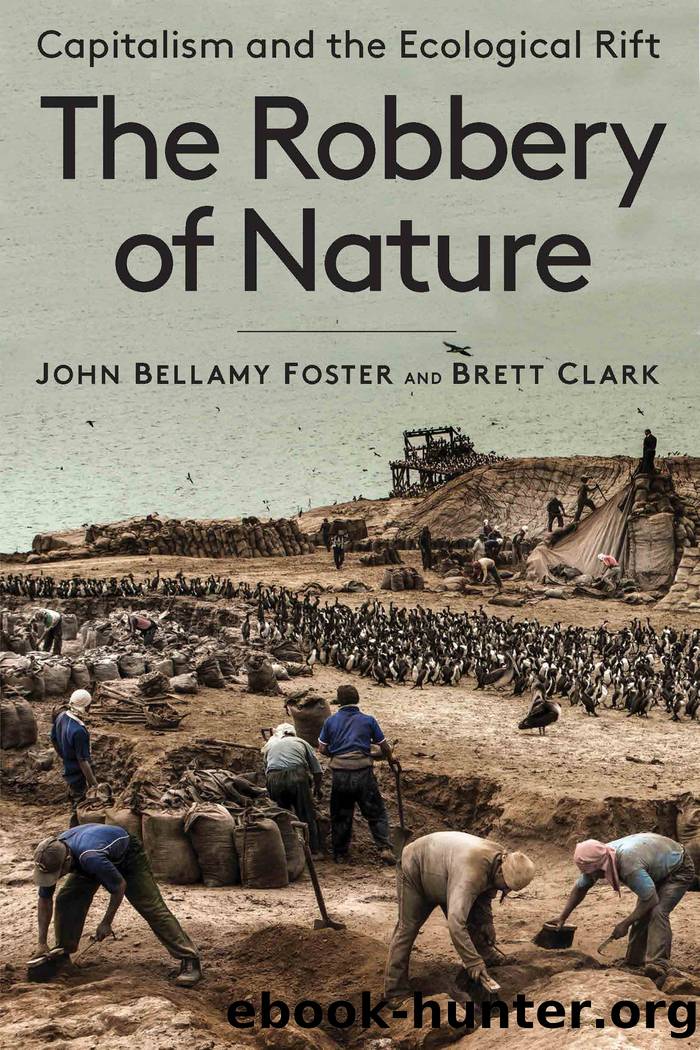The Robbery of Nature: Capitalism and the Ecological Rift by John Bellamy Foster & Brett Clark;

Author:John Bellamy Foster & Brett Clark; [Foster, John Bellamy & Clark;, Brett]
Language: eng
Format: epub
Tags: Non-Fiction, Political Science, Political Ideologies, Communism, Socialism, Public Policy, Environmental Policy, Writing, Essays, Capitalism
ISBN: 9781583678398
Publisher: New York University Press
Published: 2020-12-14T13:00:00+00:00
MARX, METABOLISM, AND THE METABOLIC RIFT
To escape such one-sided viewsâwhether idealist or mechanistic, monist or dualistâwhich have dominated much left analysis of the nature-society relation since Schmidt, it is necessary to turn to Marxâs ecology itself, in which the materialist conception of history and the materialist conception of nature formed a dialectical unity. By excavating the ecological foundations of classical historical materialism, second-stage ecosocialist theorists since the late 1990s have moved well beyond earlier misconceptions, creating the basis for a wider ecological synthesis. Here the analysis has pivoted on the dialectical approach implicit in Marxâs triadic scheme of âthe universal metabolism of nature,â the âsocial metabolism,â and the metabolic rift.63
Although in Marxâs analysis it still makes sense abstractly to differentiate nature and natural processes from the labor and production process, there is no longer any pure nature on earth untouched by human society, nor is there any pure realm of society free from the dire natural-material consequences of human actions. In the Anthropocene epoch, it is therefore all the more necessary to explore the complex, dialectical natural-social interconnections between the Earth System as a whole and capitalism as a system of alienated social metabolic reproduction within that Earth System. Today the drive to capital accumulation is disrupting the planetary metabolism at cumulatively higher levels, threatening irreversible, catastrophic impacts for countless species, including our own. It is in the theorization of this ecological and social dialectic, and in the development of a meaningful praxis to address it, that Marxâs analysis has proven indispensable.
Second-stage ecosocialism sought to return to Marx and earthly questions. The aim was to draw on the ecological foundations of classical historical materialism to develop a more unified socioecological critique. British Marxist sociologist Peter Dickens was among those who took initial steps to open up such an analysis. In his 1992 book Society and Nature: Towards a Green Social Theory, he focused on Marxâs early writings, such as the Economic and Philosophic Manuscripts, insisting that this work provides key insights into how the organization, processes, and relations of the capitalist system alienated humanity from nature. He proposed that peopleâs understanding of nature tends to be shaped by their lived experiences within a society dominated by commodity production. Although some of the baggage of first-stage ecosocialism, such as an assumption that Marx in his mature works largely ignored natural limits and promoted an extreme productivism, still remained, Dickensâs work nonetheless represented a turning point. He was critical of simply grafting deep-ecology positions onto a revised Marxism. He insisted on the need to extend Marxâs method, which included both a historical-materialist and dialectical assessment of the relationship between society and nature. From a critical-realist orientation, he explained that larger emergent properties and boundaries within the biophysical world must be recognized, and that the capitalist system was âoverloading these self-regulating ecosystems and stretching them to a point at which they [could] no longer cope.â64
Second-stage ecosocialist scholarship called into question the tendency to pit the young Marx against the mature Marx, Marx against Engels, and natural science against social science.
Download
This site does not store any files on its server. We only index and link to content provided by other sites. Please contact the content providers to delete copyright contents if any and email us, we'll remove relevant links or contents immediately.
International Integration of the Brazilian Economy by Elias C. Grivoyannis(110738)
The Radium Girls by Kate Moore(12019)
Turbulence by E. J. Noyes(8040)
Nudge - Improving Decisions about Health, Wealth, and Happiness by Thaler Sunstein(7694)
The Black Swan by Nassim Nicholas Taleb(7111)
Rich Dad Poor Dad by Robert T. Kiyosaki(6613)
Pioneering Portfolio Management by David F. Swensen(6289)
Man-made Catastrophes and Risk Information Concealment by Dmitry Chernov & Didier Sornette(6007)
Zero to One by Peter Thiel(5789)
Secrecy World by Jake Bernstein(4742)
Millionaire: The Philanderer, Gambler, and Duelist Who Invented Modern Finance by Janet Gleeson(4469)
The Age of Surveillance Capitalism by Shoshana Zuboff(4279)
Skin in the Game by Nassim Nicholas Taleb(4240)
The Money Culture by Michael Lewis(4198)
Bullshit Jobs by David Graeber(4179)
Skin in the Game: Hidden Asymmetries in Daily Life by Nassim Nicholas Taleb(3993)
The Dhandho Investor by Mohnish Pabrai(3760)
The Wisdom of Finance by Mihir Desai(3735)
Blockchain Basics by Daniel Drescher(3574)
